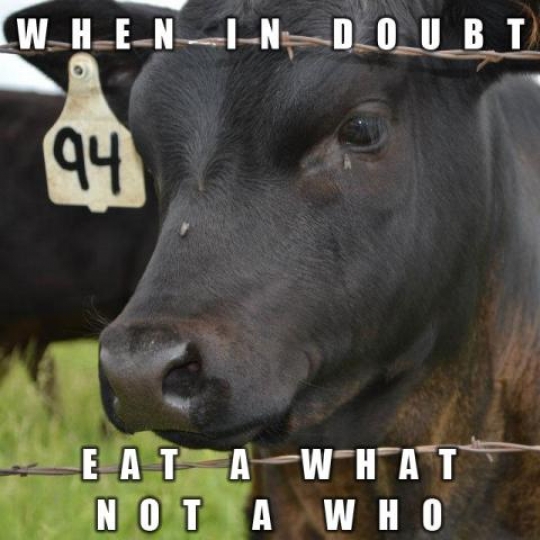I almost said that I'm expanding my focus with this article, since I usually write about animal rights. But really I'm narrowing my focus to one particular animal: the human animal.
I'm used to boycotting foods that cause harm to non-human animals. These include all animal products, and lately I've started being careful to avoid palm oil unless it's certified rainforest-safe. Palm oil is often grown in a way that destroys orangutan habitat. I've recently become aware of how harmful the banana industry can be to its workers and it's gotten me thinking about human exploitation in our food system.
Fair Trade
The term “banana republic” isn't accidental. Historically, banana companies have had the power to influence smaller countries to the detriment of their citizens. It's the fifth most-traded agricultural product, but companies keep costs low by exploiting workers. Work days can be 12-14 hours, for little pay and no overtime pay, and workers can be subjected to dangerous amounts of pesticides and fungicides.
Exploitation pervades the U.S. agricultural sector, including virtual slave labor. U.S. law specifically exempts temporary guest workers from the minimum wage and the right to organize and collectively bargain. More than half of farm laborers in the U.S. are probably unprotected migrant laborers.
Unfortunately eating isn't an activity we can just drop out of. But there are things we can do. We can garden more or shop from local small producers. We can seek out fair trade and organic sources when able. We can avoid the worst of the food sources.
Some people dislike food politics, but it's not really different than any other boycotts. It all goes under the principle "Don't fund terrible things." Because funding it causes it. Obviously we can't all afford to go fair-trade organic, but most of us can do something.
Some of the most important products to seek out as fair trade include coffee and tea, sugar, and bananas, but it's not limited to these or even to food. Common fair trade products include the above, but also cotton, flowers, fruit, even gold. Fairtrade.net is a good source for more information.
Animal products are another cause of human exploitation. In my article Making Connections I discuss a number of concerns, including the psychological harm that slaughterhouse work can cause and the resulting increase in crime in communities surrounding slaughterhouses. I also talk about how beef, in particular, is one of the largest causes of the destruction of rainforests and the murder of indigenous peoples. Now even the UN is calling for an end or reduction of meat consumption, especially beef. Going to local grass-raised can do something about rainforest destruction, but doesn't address many of the other environmental issues animal products cause.
The USDA
The USDA has recommended eating less meat (especially beef), both for personal health reasons and because of its impact on the environment. It’s facing opposition from the cattle lobby that wants the USDA to not recommend what’s best for our health or our nation’s future, but what’s best for one particular industry. If Americans are to have a real choice, they need to hear the real science and expert opinion, not just the opinion of those who want to sell us something. Especially when what they’re selling is, in the USDA’s own opinion, unhealthy for individuals and the planet. The USDA should be free to report what the current science indicates. There's a petition asking them to hold their ground. Please consider signing and asking them to hold their ground and applaud them for making a difficult recommendation in the face of adversity.
Most positive social change seems to be grassroots these days, so it's heartening to see a government agency attempting to do the right thing, and even make science-based recommendations.
If you choose to sign this, it doesn’t mean you have to make any particular diet choices. But it’ll make a stand on the side of science and the ability of a government agency to tell the truth rather than bow to industry pressure. http://act.sumofus.org/go/8770?t=2&akid=10568.331951.vVbegq
Shopping Apps
Boycotting doesn't have to be about products that involve harm in their production. It can also be about not supporting companies that use your money in harmful ways. For instance, lobbying the government or fighting against progressive causes.
Smartphone apps can come in very handy with this. They make it easy to use your money to vote your conscience. The "Buycott" app, available on both Apple and Android, "helps you to organize your everyday consumer spending so you can fund causes you support and avoid funding those you disagree with." (http://www.buycott.com/) Just scan a barcode at the store and it lets you know if the company or parent company uses your money to support things you are against.
"Goodguide" on Apple is an app that lets you see how green a product is. The "Palm Oil Investigations Palm Oil Scanner App" scans for Palm Oil and lets you know its certification status. For eliminating or reducing animal products, check out the "Vegman App", "Happy Cow", and "Is It Vegan?".
With the information and tools available today, it's easier than ever to vote with our wallets. Please consider using some of the tools above, or comment with some other useful tools below.




Leave a comment!